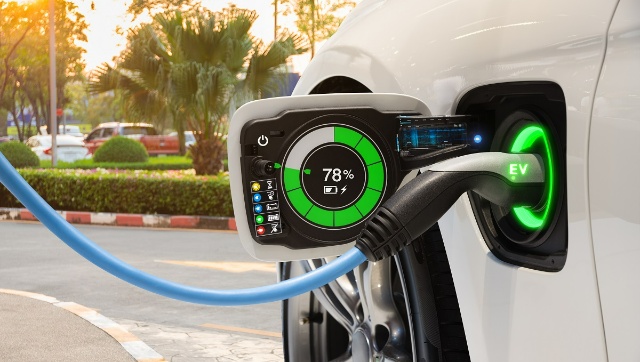An electric vehicle or EV is a vehicle which depends on electric power partially or fully instead of fossil fuels like diesel or petrol to run. Electric vehicles are economical, require low maintenance and most importantly EVs are environment friendly. The three types of EVs are Hybrid Electric Vehicles, Plug-in Hybrid Electric Vehicles and Battery Electric Vehicles. The Sustainable Development Goals or SDGs are 17 interlinked Global Goals designed to be a “blueprint to achieve a better and more sustainable future for all”. The SDGs were set up in 2015 by the United Nations General Assembly and are intended to be achieved by 2030. The SDGs cover a wide range of goals to be covered starting from no poverty and zero hunger to peace and justice, strong institutions and partnerships to achieve the goal. These SDGs also aim to achieve environment-related goals such as natural resource management, climate change, biodiversity and ecosystems, circular economy, environmentally sound management of chemicals and waste etc. Every country is paving out unique methods to help the world achieve 17 different SDGs. In this limited time frame, EVs are considered the ray of hope in the attempts to achieve Sustainable Development Goals (SDG) by 2030 related to the environment and related impacts. The transport sector is a major contributor to carbon emission, air pollution and related health issues and non-renewable energy utilization. In order to combat the climate crisis, it is imperative that fossil fuel vehicles be replaced with renewable energy resources in most of the transport and related activities to reduce emissions caused by the transport sector and lend a helping hand toward a sustainable future and SDGs’ achievement. EVs run on electricity. These electricity-using vehicles do not consume fossil fuels which in turn reduces carbon emission. Carbon emission is one of the major factors contributing to the increase of greenhouse gases that leads to global warming. The ongoing environmental depletion demands switching to electric vehicles from fossil fuel-consuming vehicles in order to achieve SDGs specifically aiming for the environment and related issues. EVs can help achieve a sustainable mobility system which includes delivery services, logistics and ridesharing. Green mobility lends a helping hand towards a better, cleaner and greener environment for the present times and for the future generations to come. Opting for sustainable policies and measures on an individual level, societal and business levels is the need of the hour in these rapid climate change conditions. The business activities should be carried out according to responsible business conduct (RBC) standards. The ethics of the business should not compromise responsible business conduct (RBC) standards at any cost in any of its activities and they should comply with the SDGs. Climate change results in adverse effects on social and ecological lives. These effects are a threat to humans, specifically the vulnerable population causing loss of livelihood lives of people and insecurities related to food and economic aspects. EVs combined with renewable energy resources and technology, takes multiple SDGs to be achieved under its ambit such as adopting eco-friendly technology, employment generation, industry innovation and infrastructure, technology upgradation, usage of renewable energy resources, accessibility of affordable and upgraded energy services, eco-transport options, environmentally sound management of chemicals and waste, sustainable industrialisation for better and cleaner future. The SDGs also focus on decent work and economic growth, industry innovation and infrastructure. The setup of new infrastructures for EV manufacturing will demand a human workforce which in turn will generate employment opportunities. This will also fulfil the SDGs related to employment, economic growth, industry innovation and infrastructure. A systematic strategy formed for disposal of used electric batteries and used parts of EVs which contributes to the utilization of renewable energy resources effectively and efficiently by converting or recycling them into further usable elements will lead to environmentally sound management of chemicals and waste, a major Sustainable development goal. Currently, India should aim at promoting and prioritizing EVs over fossil fuel vehicles in order to achieve several environment-related SDGs ranging from using clean and renewable energy resources to employment generation and poverty elimination. The collaboration of the Make in India programme and Global goals will speed up the process of SDGs achievement as the values of both these goals are very similar. The make in India programme which covers a variety of sectors like automobile, automobile components, construction, electric machinery, renewable energy, IT and business process management very well comply with the SDGs, which promote partnership for the goals(SDG-17), sustainable cities and communities(SDG-11), industry innovation and infrastructure(SDG-9), decent work and economic growth(SDG-8), affordable and clean energy(SDG-7), no poverty(SDG-1) The Make in India programme has also Increased Foreign Direct Investment(FDI) flow in the past. And with the same programme initiative, India has also improved its Ease of doing business ranking. The combination of both these programmes will help to combat the climate crisis and other related issues to it as, both the Make in India programme and Global goals aim at achieving very similar goals such as employment, innovation, infrastructure, socio-economic sustainability, affordable and clean energy for a better future, worldwide. The development agendas should now shift focus to socio-economic growth while prioritizing the environment and using clean energy resources and upgraded technology to achieve environmental, cultural, social and economic sustainability. The author is the founder and managing director of Outshiny, the parent company of the brand Arctic Fox. Views expressed are personal
Fuel of the future: How electric vehicles will drive us to Sustainable Development Goals
Sridhar Thirunakara
• July 21, 2022, 15:31:38 IST
Set up in 2015 by the United Nations General Assembly, the Sustainable Development Goals or SDGs are 17 interlinked Global Goals designed to be a blueprint to achieve more sustainable future for all. EVs will play a big part in achieving these goals in a timebound manner.
Advertisement
)
End of Article